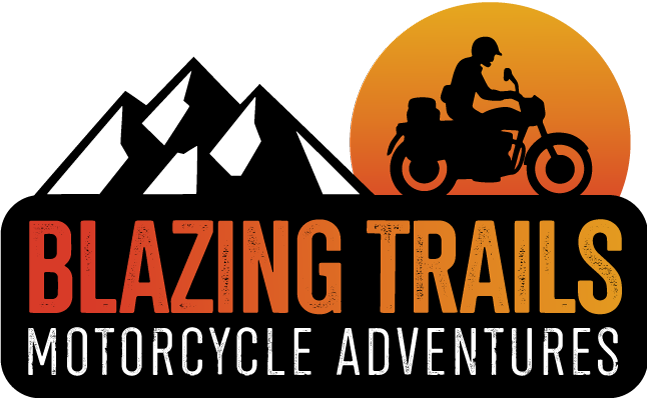RIDING IN LESOTHO
If ever the were an ‘ultimate’ bike riding destination then this is it, whether on tarred roads or dirt.
Thanks to an influx of Chinese investment, new roads have been built, old ones upgraded and sealed. These roads, nearly all smooth and grippy, spiral up and over vast mountain ranges and pass along pristine river valleys with barely a straight for hundreds of kilometres at a stretch. And using these fine roads is almost nothing motorised! Away from the main centres of population you will come across horses, donkeys and goats, but it is possible to ride for hours without seeing another vehicle.
Although many roads have been upgraded, there are still many thousands of kilometres of dirt roads and tracks, varying in condition and severity.
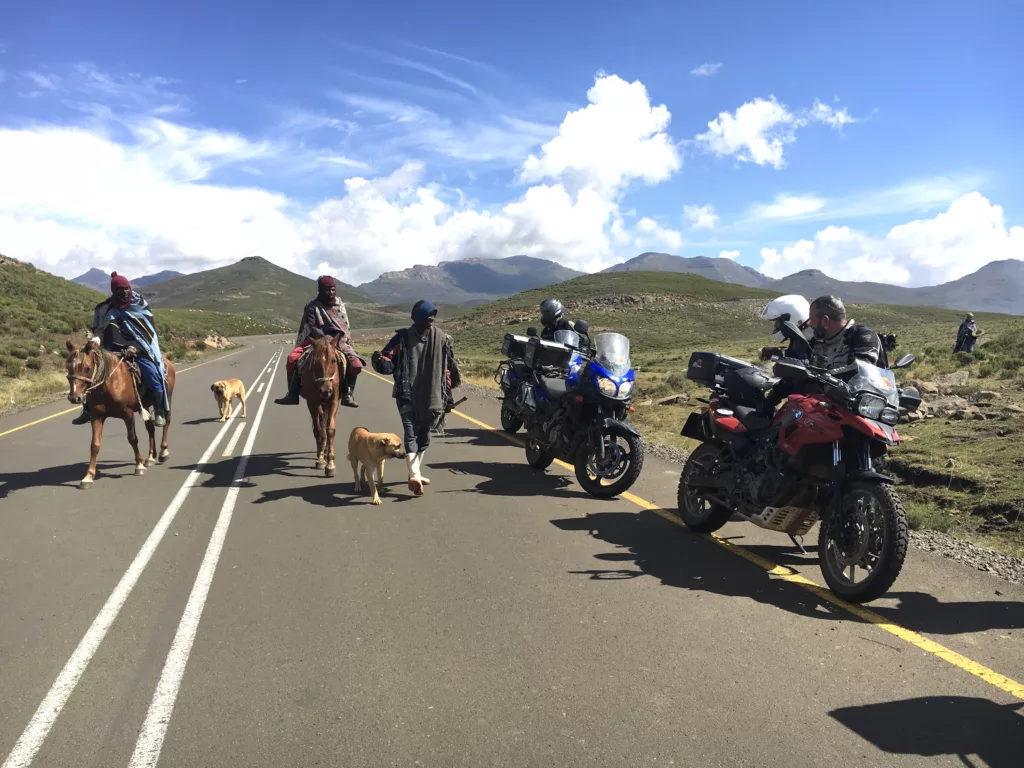
Aside from the main towns around Maseru, traffic is so scarce as to be barely worth commenting upon. When a local car/taxi is encountered in the hills, flashed lights and horn are often given in greeting and vehicles will usually pull aside to let a bike pass.
Speed limits are often silly-low, with 50kph areas very common. Worth adhering to when in towns and villages, as with such light traffic the locals aren’t expecting anything coming. On open stretches speed limits are usually 80kph, but with nobody out there they are mainly ignored.
So, take the best roads you can imagine, remove the traffic, whirl them around a stunning mountain setting and what have you got? Riding heaven….
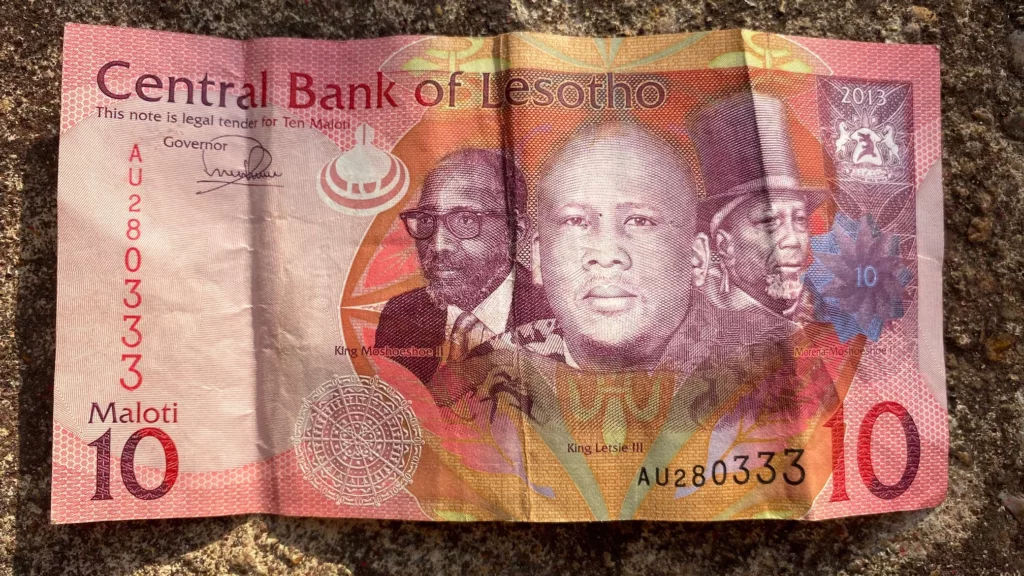
MONEY
The Lesotho Loti is the local currency and it is pegged at a one-to-one ratio against the South African Rand. Credit and debit cards are widely accepted in lodges and ATMs are commonplace in the bigger settlements. Daily essentials, such as food, drink and fuel are very cheap if you are earning in a major currency.
There are currently 24 Lesotho Loti to the UK Pound.
GEOGRAPHY
The Kingdom of Lesotho is, on average, the highest coutry in the world. Of its 30,355 square kilometres the lowest point is 1400m above sea level, with 80 per cent of the country at 1800m or above. Lesotho, an independent sovereign state, is completely surrounded by South Africa.

CITIES & DEMOGRAPHICS
Although there are a number of regional centres that are given the status of a ‘city’, most you would not recognise as such. Maseru, the capital is by far the largest settlement, with 10 per cent of the entire country’s population at around 250,000 souls. Around 75 per cent of Lesotho’s population live on the lower, warmer northern side of the country, three-quarters of those living a rural existence. The mountainous highlands are sparsely inhabited.CLIMATE
Being set at such a height, the Lesotho climate is cool compared to surrounding South Africa. In the lower reaches around Maseru, temperatures can top 30ºC in summer, down to -5ºC in the depths of winter. In the highlands temperatures can vary between around 26ºC in summer and can get down to -15ºC in wintertime. Snow is possible year-round on the highest peaks and mornings and evenings are usually cool.Lesotho has a temperate climate with well-marked seasons. Summer is the rainy season; 85 per cent of rainfall occurs from October to April, especially in the mountains. Snow occurs in the highlands from May to September. The hottest period is from January to February. Lesotho is usually a land of clear blue skies and more than 300 days of sunshine per year.
ECONOMY
Lesotho is classed as a very poor and underdeveloped country; according to UN figures 57 per cent of the population live below the poverty line, earning less than $1.50 per day. The country has the third-highest incidence of AIDS, which goes a long way to explain a life expectancy of under 50 years. On the plus side, Lesotho has an extremely high literacy rate – 81 per cent among men and 97 per cent for women.Due to only 10 per cent of the land being suitable for agriculture, Lesotho relies on imports from South Africa for much of its food.
Income is derived from diamond mining and the manufacturing of clothing. Tourism makes a very small contribution, as it is extremely low-key.
HEALTH INFORMATION
Private medical facilities are few and far; government facilities poor and overburdened. The closest decent hospitals are in South Africa and it to there that any serious casualty should be evacuated. This can be done by road or air, through a South African private emergency service. We will be taking a support vehicle on our Blazing Trails tours to Lesotho so that we can move people as necessary.You must have appropriate travel insurance to undertake any tour.
The areas covered by this tour are free from malaria, but there are some incidences in the Kruger National Park area. Please consult your physician about medical risks.
Tap water is safe to drink in most places and food hygiene is good.
POLITICS
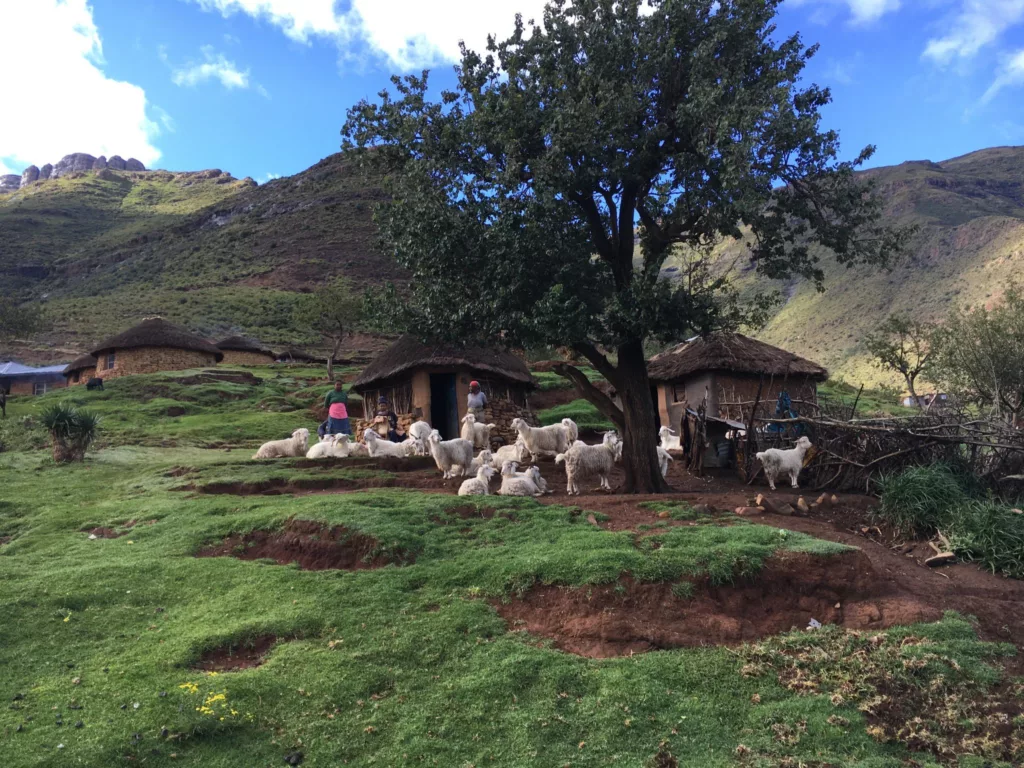
Lesotho went through many political developments during the period of 1833-1868, during which Moshoeshoe’s statesmanship and diplomacy saved the Basotho nation from extinction in wars with the Kora, the Amangwane, the Ndebele and the Batlokoa, among others. Mainly for protection in other lands wars, Lesotho became an official British protectorate in 1868. Not long after this, in 1870, King Moshoeshoe 1 died.
Following the rule of different Basotho chiefs, in around 1960 a new nationalist movement led by a commoner, Ntsu Mokhehle, emerged. Mokhehle was an educated and articulate leader of the Basotho Congress Party (BCP), which set the political agenda for the 1950s. The chiefs then formed their own party in fear of the BCP democratising chieftainship. Thus, under the leadership of Chief Leabua Jonathan, the Basotho National Party (BNP) was formed.
In 1963 the Constitutional Review Commission approved a Westminster-style government, which saw King Moshoeshoe II enjoying few powers. This meant 60 seats to be elected by adult suffrage in the Lower House, and the Senate would consist of 22 Principal and Ward chiefs and 11 monarch-nominated members. The Constitution, meanwhile, received support from Britain and elections for the first government were held in 1965 with independence following in 1966.
The post-independence period saw alternation of power between BNP and BCP. Following a military-led overthrow of the BNP government in 1986, the country was under military rule until 1993, when the King was given executive powers and political parties were banned. Long-awaited general elections were held in March 1993 after revision of the Constitution – the result was a landslide victory for the BCP. The BCP ruled until a split led to the formation of Lesotho Congress for Democracy (LCD) ahead of the controversial 1998 elections. LCD won the 2002 and 2007 elections, finally splitting ahead of the 2012 elections and forming the breakaway Democratic Congress, led by the outgoing Prime Minister.
In May 2012 the results of the general elections led to formation of the first-ever coalition government by three parties: All Basotho Convention (ABC), Basotho National Party (BNP) and Lesotho Congress for Democracy (LCD). This tripartite coalition currently rules Lesotho.
The King is the Head of State and Principal Chiefs are responsible for different districts in the country.
To the present, the political situation in Lesotho remains in tension between the influences of royalty, the two main political parties, the police and the military. Although this leads to drama, minor coups and intrigue, the political situation has never made Lesotho dangerous to outsiders.
Crime & Annoyances
Begging can be annoying, but is to be expected due to low incomes and does not happen on a daily basis. This usually takes the form of children begging at the roadside and occasionally non-threatening approaches by adults. There are reports of children throwing stones when cars fail to stop and hand out sweets – we have not experienced this on the bikes in Lesotho.
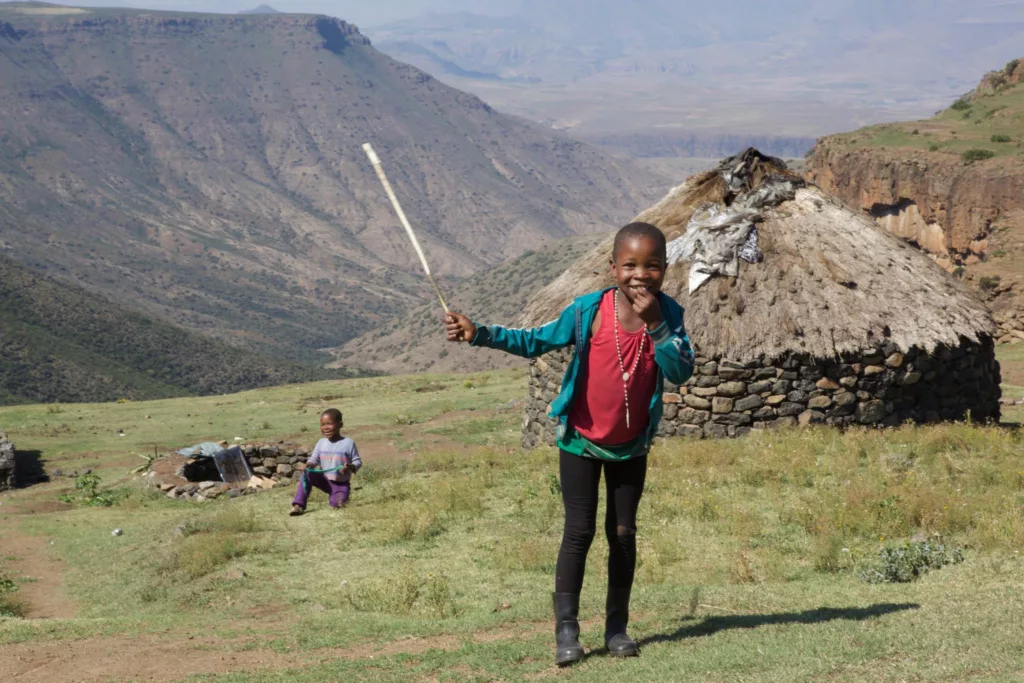
DOCUMENTATION
You will need a passport and appropriate travel insurance. Currently UK citizens (and those from many countries) will be granted a tourist visa upon arrival in South Africa and Lesotho. It is, however, your responsibility to check that you can legally enter the country. Most ‘western’ driving licences are also valid (with photo and written in English), but please also check your status before travelling.
CURRENCY
You should get by on around £400 spending money if you don’t do a lot of shopping. Cash and travellers’ cheques can be changed at the airport and in the larger towns. Cash points are widespread and most vendors accept credit/debit cards. Cash is best for fuel stations as it speeds up what can otherwise be a lengthy process. Depending on what bike you choose and how you ride it, expect to part with about £100 for fuel.
CLIMATE
At the time of year we will be visiting, South Africa should be nice and sunny, but not too hot, even at the coast. Obviously, though, we can’t guarantee this and you should be prepared for the possibility of a couple of wet days. Lesotho, due to the altitude, can be cold in the early mornings and evenings, though generally the days are warm and sunny. The maximum temperature is likely to be around 30ºC on the coast/in the desert; the minimum 0ºC (at night in the mountains, if it has been overcast during the day).
BIKE KIT
We advise riders to consider their kit in terms of layers, so you can adjust to be comfortable during the course of a varied day. Clothing as you would wear on a tour of Europe is perfectly suitable, whether leathers, or textiles. Some kind of waterproofing is a very good idea. Bring something warm for the evenings. Good gear can also prevent a minor spill causing a trip-ruining injury, so we require that you ride with no exposed skin (except your face).
LUGGAGE
While your main luggage will be carried in a support vehicle, your bike will be equipped with a top-box for carrying spare kit, cameras, water, etc. Your main bag must be ‘soft’ and not a suitcase.
FITNESS
You need not be any more fit on this tour than if you were riding in Europe. However, if you have any existing medical condition that may affect you during the tour, please consult your doctor and Blazing Trails before booking. With maximum altitudes of around 3000m, some altitude-related discomfort is a possibility, however altitude sickness at this level is unlikely.
RIDING SKILLS
While we insist those joining us have a full motorcycle licence, and recommend a minimum of a year’s riding experience, time in the saddle and miles ridden are of more relevance to a tour like this. There are a couple of longer days in the saddle, up to a maximum of around 550km (350 miles) in a day. We do, though, try to design the tours so you get an easier day, or down day, after a long ride.
HEALTH & HYGINE
South Africa and Lesotho are very clean and hygienic countries (in SA we’d say more so than the UK), with clean ablutions and usually safe tap-water, so the chances of getting even a ‘holiday tummy’ are low. The areas through which this tour passes has no malaria risk.
EATING & DRINKING
South African restaurant food will be familiar to those coming from the West. Food is of a high standard and is very good value (especially meat and seafood dishes), being less than half the equivalent cost of the UK. One of the world’s great wine producers, South Africa is a great place to sample the grape, which is also great value for money. Decent beers (mainly lagers) are available everywhere.
On our tours, food other than breakfasts will only be inclusive where there is little or no choice, or where we have arranged something special (barbecues etc). For the number of meals included in the trip, see ‘What The Tour Price Includes’ (above). We have arranged the tour like this so participants can choose the what, wheres and explore for themselves. Not everybody wants to eat in a group every night, eat the same thing, or at the same time. We will, however, be happy to advise on eateries…
EXCURSIONS
As with eating, we do not want to prescribe what non-riding activities you choose to participate in. In many places there are several options, so we will be happy to advise, put you in touch with the right people and let you decide. If you want to add days to your tour, in order to do some wildlife viewing or any other activity let us know and we will arrange it for you.
PERSONAL SAFTEY
While South Africa has had some pretty bad press in recent years for violent crime, very little of this nature happens in the tourist areas through which we will be travelling. And, as ever, the media tends to sensationalise the bad and ignore the good. Being guided through the ‘right’ areas in a group greatly mitigates the chances of encountering unpleasantness. Petty crime – pick-pocketing and theft – happens, as it does in virtually all tourist destinations with a wide gulf between rich and poor. A few simple precautions, like keeping your wallet/docs in an inside pocket and leaving nothing unattended on the bike, should mean a trouble-free tour. The mountainous areas of Lesotho have incredibly low incidences of crime.
MEDICAL FACILITIES
Southern Africa has developed enough emergency services and an efficient private health-care system. Lesotho is less developed and so should a serious incident occur, any casualty would be evacuated to South Africa for treatment. Travel insurance, including medical cover, is compulsory on this trip.
